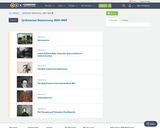
- Subject:
- U.S. History
- Material Type:
- Unit of Study
- Provider:
- Rice University
- Provider Set:
- OpenStax College

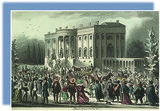
A New Political Style: From John Quincy Adams to Andrew JacksonThe Rise of American DemocracyThe Nullification Crisis and the Bank WarIndian RemovalThe Tyranny and Triumph of the Majority
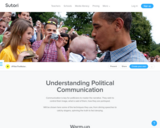
Why do politicians lie? Why do they kiss babies foreheads when in campaign? Communication is key for politicians to master the narrative. They wish to control their image, what is said of them, how they are portrayed. They are flexible and adapt to the situation at hand.
Will be shown, spread out over 3 sections, are some of the techniques they use, from stirring speeches to catchy slogans, spinning the truth to fact denying. They rely on polls to measure public opinion, use focus groups to sharpen their words, fall back on stats when required. The sections:
Mastering the words
Mastering the image
Mastering the narrative
To sum all this info up and provide a concrete example, we'll take a look at a news segment where Kellyanne Conway, who at the time was a counsellor to the President of thr USA, is intervewed by a journalist. She truly masters the art of discrediting questions, taking the focus away from them, playing the victim, creating empathy, blurring the lines between truth and lies, fact and fiction.
There is a breakdown of some of the words and techniques she used as she tussled with the journalist.
--
Part of the political science collection.
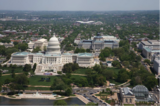
United States Government: The Basics of Government Function, Structure, and ProcessDeborah Smith Hoag, Remix Lead AuthorRichard Fonte, Remix AuthorGlen Krutz, Content Lead - OpenStax VersionSylvie Waskiewicz, Lead Editor/OpenstaxCover Photo Attribution: Carol M. Highsmith (2007) Library of Congress
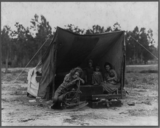
This migrant agricultural worker’s family might find participating with government difficult when daily life is a struggle. Does socioeconomic status affect civic participation? (Credit: Dorothea Lange; Library of Congress Collection)

This subject examines the unique culture that developed in the United States after World War II. The dawn of the nuclear age and the ensuing Cold War fundamentally altered American politics and social life. It also led to a flowering of technological experimentation and rapid innovation in the sciences. Over the course of the term, students will explore how Americans responded to these changes, and how those responses continue to shape life in the US today.
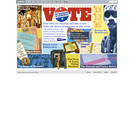
This site looks at the history and variety of voting methods in the U.S. -- the voice vote, party ticket (paper ballots listing candidates from just one party), Australian ballot, gear and lever machine, and others. Voting reforms of the early 1900s, when the U.S. electorate doubled, are described. Kinds of voting equipment used in counties across the U.S. are shown on a map. Innovative design improvements are discussed.
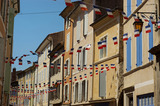
In this Wonder of the DayR, learners will be introduced to the French Revolution. They will explore what the French Revolution was,What caused the French Revolution, and What the French Revolution accomplished.
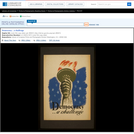
Poster for democracy showing the hand and torch of the Statue of Liberty. Date stamped on verso: Aug 1 1940.
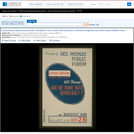
Poster announcing a public forum to be held at Roosevelt High School, Des Moines, Iowa, at which Lyman Bryson will discuss the future of democracy. Date stamped on verso: Oct 29 1940.
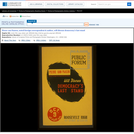
Poster announcing a public forum at which Pierre van Paasen will lead a discussion on "democracy's last stand" held at Roosevelt High. Date stamped on verso: Oct 29 1940.
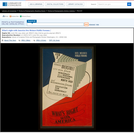
Poster announcing public forums with Bonaro Overstreet; citywide forum discussing "democracy as a personal experience" to be held at North High, Des Moines, Iowa, and neighborhood forums discussing "education for democracy." Date stamped on verso: Jan 29 1941.
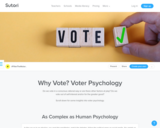
Do we vote in a conscious rational way or are there other factors at play? Do we vote out of self-interest and/or for the greater good?
In the run-up to an election, you read the manifestos, watch the debates, follow the political news on social media. You weigh up the pros and cons of each candidate/party, think about what matters to you and who is best placed to make that happen. You then turn up on election day and vote accordingly. You are a rational being and therefore vote rationally.
Simplistic no?
Reading through the academic literature on this subject is as complex as human psychology. Many other factors come into play if and how a citizen decides to vote.
There can be forms of altruism at play but also forms of egocentrism (the voter's illusion); a sense of duty; the belief that my vote makes a difference and that others are more likely to turn up and vote the way I vote. Research has also shown that turnout increases in highly contested seats.
Conversations, civic duty, social pressure can also have an impact as well as genetics.
Some highlights from research are featured in this resource, part of the political science collection.